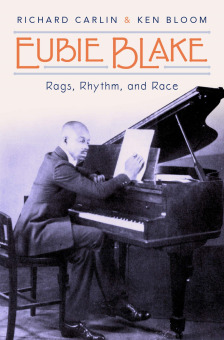RACE TO THE TOP
James Hubert Blake was born in the nineteenth century and lived into his late nineties (He falsely claimed to have reached 100, but that’s show biz.) The eleventh child of parents born in slavery, he lived through two world wars, the depression, the civil rights movement and received the Medal of Freedom from Ronald Reagan. The story of his life is quintessentially American, achieving the ultimate accolade of being made into a Broadway musical, Eubie! Rags to riches doesn’t begin to describe his journey.
Eubie Blake (r) in front of his parent's home when he was about eight years old.
Eubie Blake – Rags, Rhythm and Race, Richard Carlin & Ken Bloom’s excellent, well-researched biography details a life which is also the story of American music in the twentieth century. In appropriately euphoric style it charts Blake’s progress from self-taught saloon piano player to elder statesman of jazz.
On their earliest sheet music, Sissle and Blake were prominently promoted as The Dixie Duo.
By the time he was fourteen, Eubie was playing piano in bars and whorehouses. As ragtime evolved into jazz, he graduated to dance bands. In 1915 he began writing songs with fellow band member Noble Sissle, getting off to a fine start when they sold their first song “It’s All Your Fault” to the great vaudeville star Sophie Tucker.
Sophie Tucker premiered “It’s All Your Fault” on stage, August 21, 1915.
In 1921 their musical revue Shuffle Along was the first Broadway show entirely written by African Americans. The show was a huge hit (the young Noël Coward was a fan) and ran for 504 performances even though the top ticket price was a then astronomical $3.
Noble Sissle and Eubie Blake, c. 1920.
As Eubie’s brand of music began to cross over into mainstream entertainment it was increasingly co-opted by white composers and musicians, most notably Irving Berlin and George Gershwin, who brought jazz to Carnegie Hall. Unfortunately, the integration of black music into white America was not matched by a similar social integration. Indeed, on reading of Eubie’s experiences of prejudice in the earlier twentieth century, and in light of recent events, one is forced to conclude that progress is still all too slow.
Eubie’s story is the American Dream encapsulated, in all its highs and lows. And it’s a great ride. Highly recommended.
photos courtesy Oxford University Press
Eubie Blake – Rags, Rhythm and Race
English | Hardcover : 472 pages, 28 photographs
Oxford University Press; 1st edition (August 10, 2020)
available at Amazon

